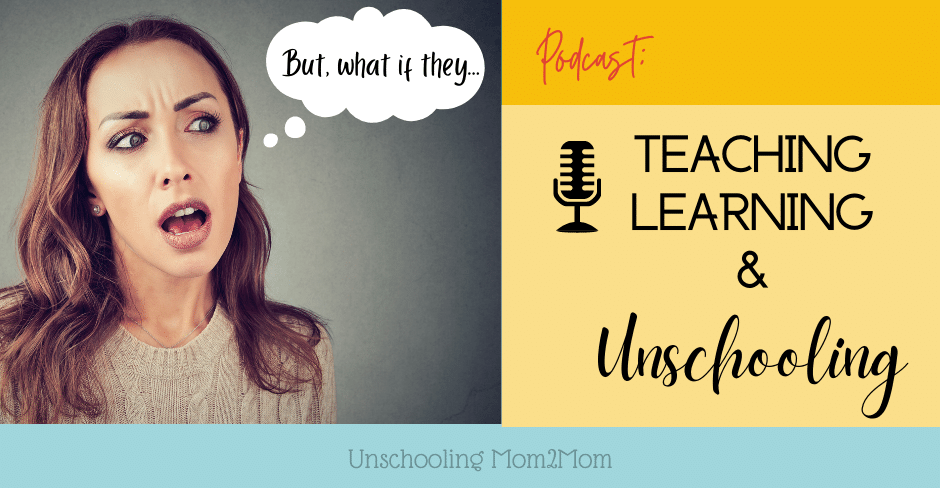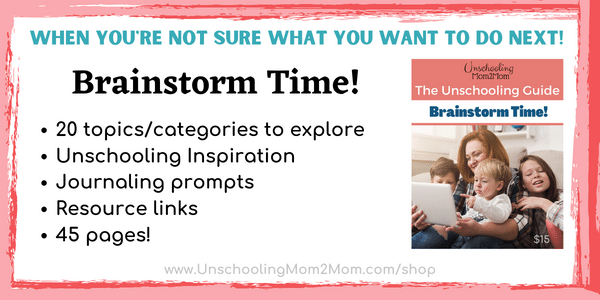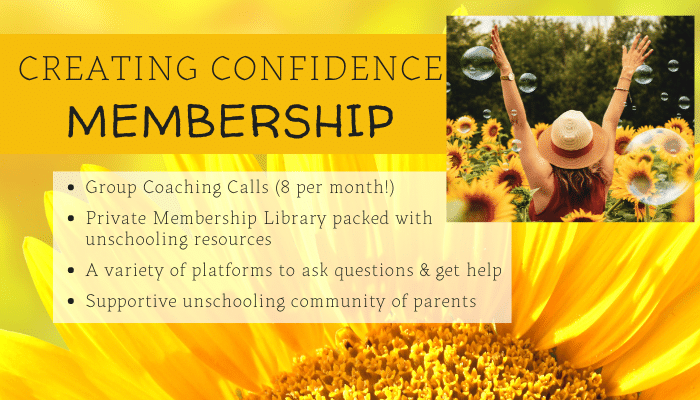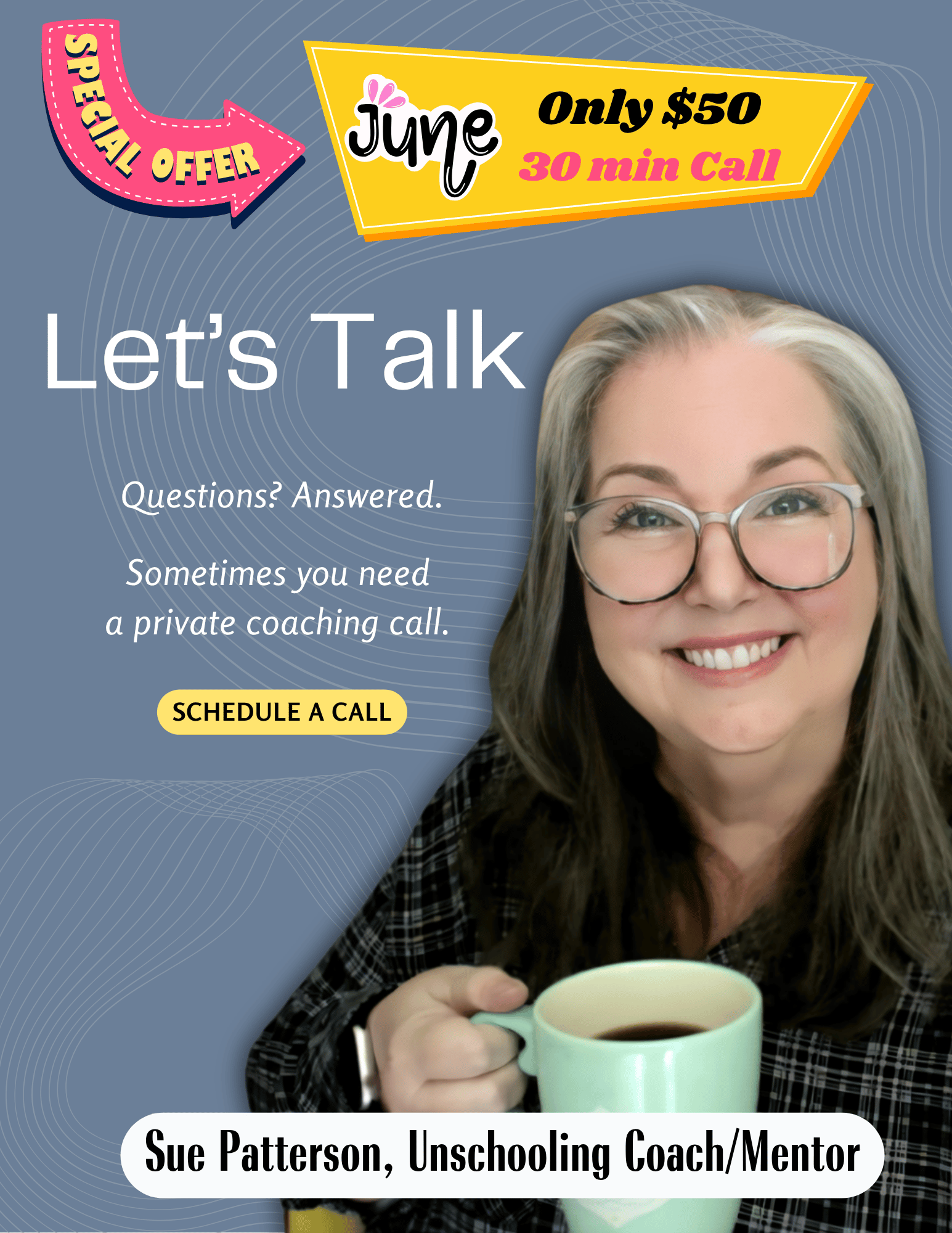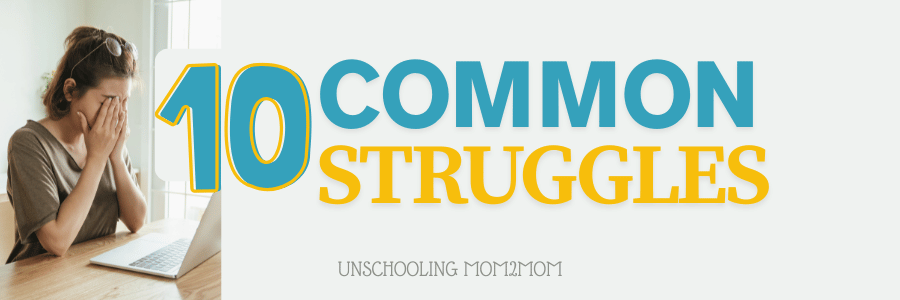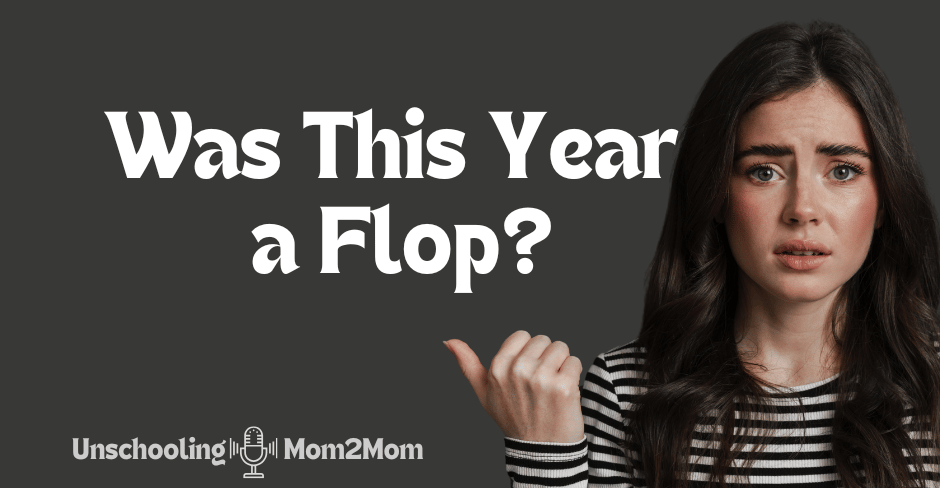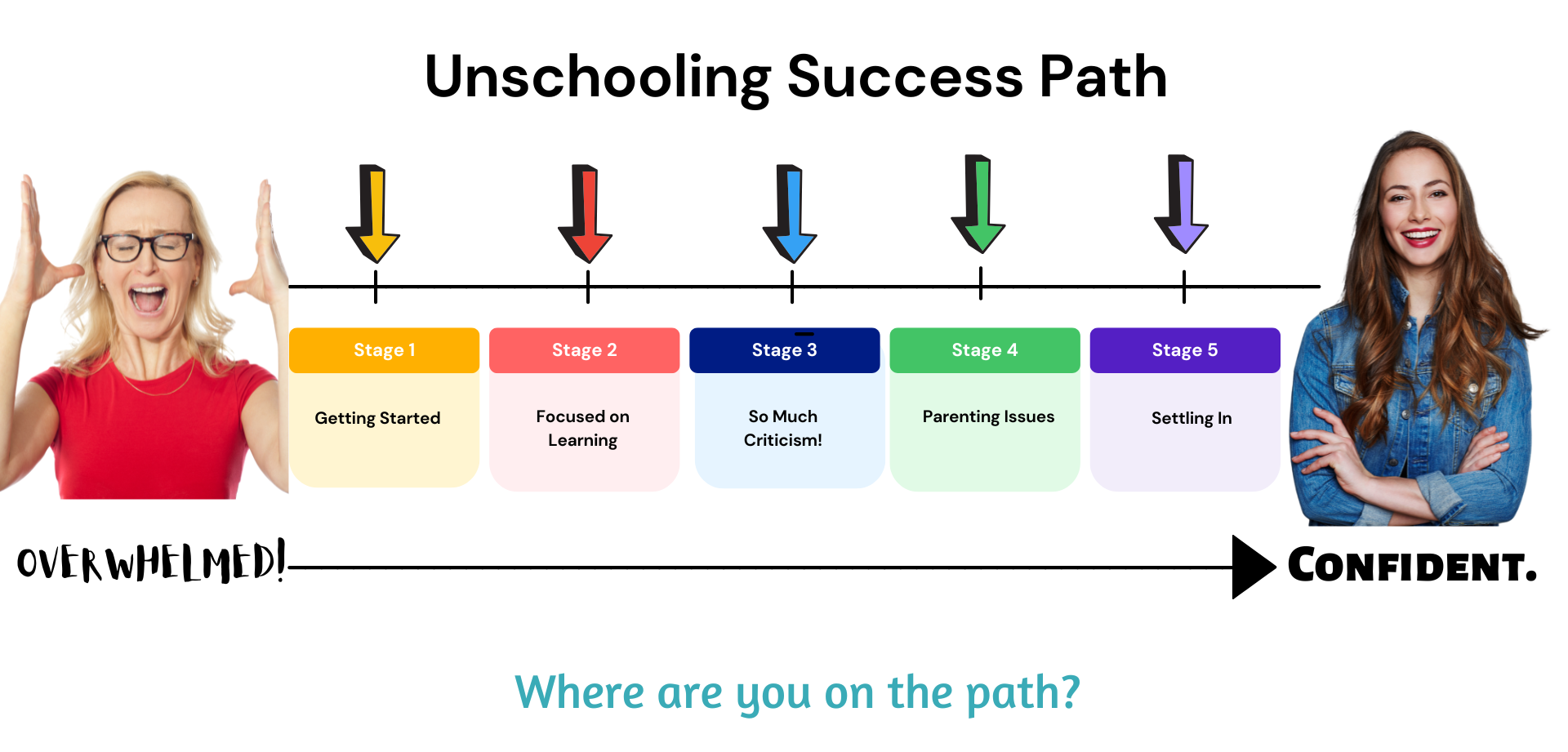Unschooling, Teaching and Learning
Have you heard this? Is it one of those statements that makes you think:
"Ahhh... that’s why we don’t do unschooling! Too fringe, too kooky, and not going to help the kids at all in the long run."
Or maybe you are already unschooling and you’re thinking,
“Don’t say that - that’s what the big battlecry against unschooling is.”
Or one of them.
What made me start down this path for you here on the podcast was that Rolling stones article singling out the unschooling mom on TikTok who said,
“We don’t Teach."
And that was the “hook” they started their article with.
Even within my own unschooling community, people have said,
“I just wish she hadn’t said that. It’s such lightening rod kind of thing.”
It IS what the general public as well as the traditional homeschooling community often uses to dismiss unschooling. Comments like...
- “Those unschooling families don’t do anything."
- "They’re not teaching their kids anything."
- "Unschoolers are being neglectful."
- "Those kids are going to have horrible futures.”
Lots of scary thoughts all wrapped up in
“We don’t teach.”
But that’s not really the truth of it.
You have to back up a little bit more to see the bigger picture. There are a few factors at play here.
I don’t think you’re getting the whole story. Stay with me - that’s what we’re going to talk about.
When you understand it, you’ll be able to toss away ... at least one of your worries about unschooling.
But first...
Hi there!
If you’re new here, Hi! I’m Sue Patterson.
Welcome to the Unschooling Mom2Mom Podcast.
I’m a Mom to 3 grown unschoolers all in their 30s now with degrees, certifications, businesses, homes, families... all the things. I’m the human behind all things Unschooling Mom2Mom with a big website full of free and paid unschooling resources just waiting for you over there [here!]- so tap into it all.
Each month, I do some kind of special - this month my courses are half off - so that’s a pretty great deal.
And I have some really exciting things coming! All of this is because you, as the parent - just like your kids - have different learning styles and preferences.
And whether you like learning from a PDF, a course, a 1:1 Coaching call with me or with a community of other unschooling parents - you have options available that will work! You really CAN get your questions asked and answered, feel supported, and basically strengthen your confidence in unschooling.
If you’re not new, welcome back! Thanks for listening! Please leave comments about what you think, like, subscribe, you know... everything that tells the powers that be to share the Unschooling Mom2Mom podcast (or video if you’re listening or watching on YouTube) I would really appreciate that!
On to that scary and really confusing idea about Not Teaching.
And why any sane person would say that’s a good idea.
The TikTok Unschooling Mom who said
“We don’t teach our kids,” isn’t the first. She’s actually kind of young, so I’m doubting she was involved in the conversations of the 90s or early 2000s. But it was very commonplace to want people to stop using the word, “teaching” in order to get everyone to focus on the importance of LEARNING.
As it turns out, teaching and learning are not as synonymous as we’ve been conditioned to believe.
As a society, we have conflated these two terms or ideas: “Teaching” and “Learning.”
We tend to think, teaching
causes learning and so learning would have to require a teacher.
We all know situations where the teacher brought information and the student was distracted or not interested. No learning happened. Think of looking at the window while the teacher goes on and on. Or of kids thinking about leveling up in their video game instead of the topic the teacher wants to discuss. There’s a reason that Charlie Brown depiction of the Teacher voice going “Wah-Wah-Wah” resonates with everyone - it’s often mind-numbing get-it-over-with way kids view their classroom experiences.

And we’ve all had the experience of our kid coming up to us, telling us some random piece of information and we’re like, “How do you know that???” And they saw it online, or talked to a friend, or don’t even remember. But they LEARNED. Without a teacher and without a lesson plan. Those things were more like School System trappings that had more to do with that system, and not much to do with the students.

Think of all the things you’ve learned after you graduated from school. You wanted to know something or do something and you needed to learn something to achieve your goal. So you googled it, or found a YouTube video, or talked to that friend of your uncle’s. Or some other path that got you what you needed.
You didn’t say,
"I must find a teacher. I must find a class. I must learn a bunch of information that isn’t really pertinent to what I need, so I can get that one nugget of information I’m missing."
So when people say that unschooling kids don’t learn
nothing could be further from the truth.
They learn in all kinds of ways.
Compiling little bits of information that are relevant to their goals and help them achieve them.
And that IS how unschooling works. Unschooling parents help their kids learn how to find the resources they need. They’re a tour guide, a researcher, a resource finder, a cheerleader - almost a project manager. Each child identifying their own Project, so to speak.
Learning is something that’s internal. Teaching is more an external force being placed on the other person. Sometimes they’re in agreement with what’s being taught - and sometimes not.
So that’s why we say Learning is all up to the Learner.
They’re the GateKeeper so to speak.
So, the tiktoker is right in a sense. “Not teaching” or focusing on the teaching over the learning is a part of how unschooling really DOES work. When we set up a teaching plan, we’re trying to get our kids to learn what all the other kids their age are learning, regardless of their interest or curiosity. Those things have to take a back seat, because the TEacher’s Plan is what matters most. We hear that in the voices of traditional homeschoolers when they express concern that they haven’t made it through the curriculum yet or on the schedule they planned. This tug to prioritize the curriculum over what’s happening with the learner - that’s the problem.
Some of the questions I’ve heard when I talk about this are...
“Ok, but they’ll need The Basics so they CAN do all that exploring on their own.”
That may even be an entire podcast of it’s own - there’s a lot wrapped up in that!
- If they truly need something, they’ll get it.
- They’re not exploring “on their own.” Unschooling parents are there, answering questions, finding opportunities that fit their situation and allow the kids to learn and grow. They’re a family unit - not something that ends when the bell rings at 3:00.
- And what ARE
The Basics? We’ve all been pummeled by those words. Reading, Writing, Arithmetic?
All of those are to either be able to gain information or convey that we know something or figure something out. But don’t those who don’t enjoy reading still learn from videos and conversations? Don’t we carry calculators with us everywhere with our phones? Do we really write a lot these days? All of us? I think sometimes if we get more details about our concerns, and let go of our position a little so we can maybe hear alternatives, we can get a more realistic idea of what’s really needed.
Another Question:
“I think some things HAVE to be Taught. They’re not just absorbed organically.”
I don’t disagree with that. But the learner has to want it. And if they’re somehow, even kindly, coerced to think it’s in their best interests, that’s not really the same as wanting it themselves. That might give you SOME results you want...but I’m not sure all the Teaching Effort is going to pay off in what the Learner actually retains. 🤷🏼♀️
Anyone with more information can be a teacher of some sort though.
I teach my kid how to ride a bike or how to tie their shoe or how to use the measuring cups to make brownies, or a variety of different things.
But just like potty training - you can work and work and work on it.
But until they’re ready, they’re not learning it.
Same principle applies to all of this:
If the learner wants it, they’ll keep it.
If they don’t, it won’t stick - No learning is really going to take place.
I can check the box, so to speak, for having “taught” it (air quotes) But if the goal was to have learning happen, that’s all up to the learner, right? That’s where we can apply that phrase, “in one ear and out the other.” We did that ourselves as kids - because the focus was on the system (whatever system you’re in - school or traditional homeschooling curriculum) - but it’s about APPLYING THE SYSTEM to the kid instead of helping them learn.
And that’s the style most familiar to everyone. So it’s not easy to shake that.
I have another podcast,
#7 Teaching, Learning, and Partnering with our kids.
That would be a good one to follow up on after this...
[I've put it below].
I did make a workbook to help you dive a little deeper - I help you walk through all of this to see things from the Learner’s perspective instead of just bulldozing in because you’re the Teacher or the Adult-in-Charge. A lot of these podcasts have workbooks that go with them - over in my
Creating Confidence Membership group. We talk about these kinds of things within the membership community too - so that may be something you should tap into.
One little sidenote:
Change doesn’t happen overnight.
And you can make little changes, without a complete 180.
These concepts weren’t that easy for me to embrace when my kids were growing up.
So if you’re still a little skeptical - you’re not alone.
What helped me was seeing examples of these teaching learning concepts looking differently from how I experienced it as a kid. Talking with others who are working on this and aren’t trying to shove a bunch of curriculum down their kids’ throats... that probably helped me the most.
So reach out if you have questions. Enjoy the kids.
And know that
Unschooling really DOES work.
See you next week.
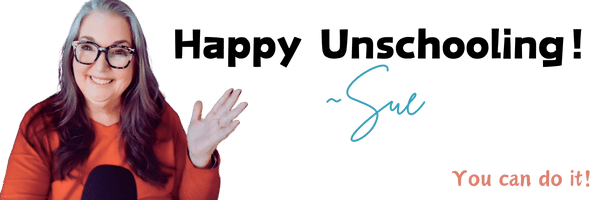
It's time to talk about reframing teaching, learning and how it relates to unschooling.
“I want their learning to be INSPIRING to them!”
“I seem to fall back on the way I learned in school.”
“What am I supposed to DO?”
Parents come to me all the time WANTING the educational experience with their kids to be creative and full of excitement. But even when they start out that way, the familiar school approach pops up and they begin to question it all. Worries about “staying caught up” or if they’re learning “enough,” come flooding in and crowd out all those fragile little thoughts of creativity and discovery.
It’s ok. You’re learning something new. All of your life, up to this point, you’ve been conditioned to keep conforming and believing in the fallacy that there’s only one right way to learn. But that’s what we’re here to help you offset, right?
So let’s jump into the ideas that trip up a lot of people.
- You don’t need to teach.
- You don’t need to plan.
- You don’t even need to have “excellent follow-through.”
I know, shocking, right? You’ve probably been beating yourself up over that one for quite a while! It's time for reframing what we think about teaching, learning, and partnership with our kids.
Unschooling embraces spontaneity. So if you’re an in-the-moment kind of person, that’s exactly what your kids are going to need from you! Even if you're not a particularly spontaneous person, the kids need you to meet them where they are each day… wherever that may be. This enables you to see what their interest is and what the next step should be - without being distracted by expectations of completing assignments or following through.
Do you ever go to bed with big plans, but wake up forgetting what those were! I know *I* did that for a really long time! It’s not that you’re forgetful or airheady - it’s that those plans weren’t really that meaningful for you. Or maybe the story in your head about what the day was going to look like when you wake up was drastically different from the reality. Those stories in our heads can really create more problems than we ever realized!
Instead, how about waking up to see what the day has in store for you?
- What’s the weather like… that may give a hint as to what kinds of things can be done today.
- Which kid looks like they’d enjoy a little more connection time with you? What would that look like?
- What’s a general structure in your family’s day - morning people or night owls? Maybe some of each?
- When are they hungry? When is their most energetic time? When is their slump?
When we’re in school, none of those questions matter. Everyone has to do what everyone else does in order for the wheels of the system to turn... rain or shine, no matter what the mood. But you’re a family, not a system. And that means you get to pay attention to the ACTUAL needs and preferences of the individuals IN your family.
Schools throw around words like “individualizing” the learning and the experience - but that’s a drop in the bucket compared to what families can do when it comes to individualizing!
Instead of thinking in terms of school academics - that’s so limiting! - what do they ENJOY?
What do they want to DO? How would they like THEIR days to go?
The learning will happen AS they are doing these things. It’s unavoidable! When we want to get better at something, we discover we may need more skills or competence. And then that directs our next moves. Humans enjoy challenging themselves. It’s just that we can’t always see what’s going on in someone else’s brain and we don’t really know what part of a particular activity is more challenging than another - or maybe which they simply have to tolerate to get to the outcome they’re looking for.
Learning is an inevitable byproduct of living immersed in your daily activities!
PLUS, they’ll have the added advantage that they’re acquiring confidence in their own abilities to direct their course in life. They’ll get opportunities to practice seeking out the resources needed to get what they need/want from their lives. This is the start of all of that. This also may help you feel better about the idea of the activity they’re engaging in. You might consider it “fluff” or not of any real consequence for their life. But the “soft skills” they are acquiring are VERY important. Again, not always something we can witness and check a box - but they’re capabilities they will take with them into another activity that may or may not even be related to where they first picked up the skill.
Brainstorming with the Kids!
If you're wanting to reframe how you look at learning, it's helpful to look at everything ALREADY available to you and the kids.
- What's happening in your world?
- What's available at home? What's out in the community?
- What interests them - even just a little?
This Guide is really a workbook for you to do WITH the kids. Since you're not plugging them into curriculum, what's out there?
They don't have to be wildly fascinated with every option - but help them see that a full rich life IS available to them!
If you click the link, you'll see a little more about this Guide.
I think it's my favorite one!
“Ok, what kinds of things are we supposed to be doing?
“What if they never stop playing ____?”
Well, your lives are not going to look like school. It might look more like a Saturday or a Summer Vacation that never ended. The kids aren’t going to reach over for a textbook after a certain appropriate number of weeks of decompression. That was never the point of deschooling.
Life doesn’t really divide itself up into neat and tidy subjects.
That only happens in schools - and your kids don’t go there anymore.
So instead of focusing on doing math, reading, history, spelling, etc., unschoolers focus on interests.
And that’s how their days fill up.
If fear still has a hold of you and you’re still knee-deep in your own deschooling, you can look at their activities and make mental notes of the subjects that weave throughout their activities. It’s usually not limited to one, like in a classroom.
But it’s more like multiple subjects weaving together, sometimes heavier in one than in another - like thread in a tapestry!
Surround Yourself with Unschooling Support!
Whether you learn best from reading, watching videos, or connecting with other like-minded parents, you'll get the support you need from DAY ONE in this Unschooling Membership Group.
It's so great to have a supportive community available to you at any moment (we have a private Facebook group and WhatsApp channel) as well as the Live Zoom Calls with Sue every week. You'll be able to see the transformation you're looking for - WITHOUT the two-steps forward, three-steps back pattern!
You Don't Have to Do This ALONE!
AND! I have so many PDFs and Unschooling Resources to walk you through these hurdles!
When you join the Membership Group, be sure to ask me where the Teaching/Learning Reframing Tool is - it will give you more specifics on what to do! And, my favorite Brainstorming Guide is INCLUDED in the Membership!



